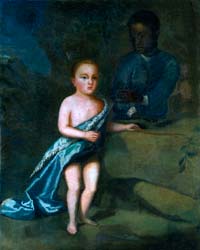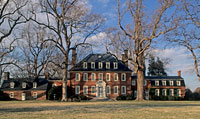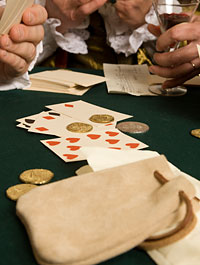Page content
William Byrd III
- Born to a wealthy family in 1728
- Becomes man of great stature in Virginia
- Lavish lifestyle and gambling lead to debt
- Commits suicide in 1777
Born to wealthy family
William Byrd III was born September 6, 1728 and raised at Westover in Charles City County, the only son of William Byrd II and his second wife, Maria Taylor Byrd. In 1744, Byrd went to London to study law at the Middle Temple. This is likely where he started gambling, a weakness that plagued him the rest of his life.
Byrd returned to Virginia by 1748, when he married Elizabeth Hill Carter, a member of another of Virginia’s great colonial families. They had four sons and one daughter. Not yet 21 when he married, Byrd gained full control of an estate that included more than 179,000 acres, hundreds of slaves, mills, fisheries, vessels, warehouses, and a store. Byrd also assumed all of the other roles an upper class Virginian was expected to fill.
Debt begins early
Byrd could not live within his income, and as early as 1755 he was in dire financial straits. He conveyed his estate in 1756 to seven trustees, who sold land and slaves worth £40,000, a huge sum that still did not pay off his debts. In 1768, Byrd resorted to a lottery, the prizes for which were to come from his estate at the falls of the James River. Even these efforts did not cover his debts.
Debt was not Byrd’s only problem. In the summer of 1756, a report circulated that he had repudiated his wife. After turning his estate over to his trustees and sending his three eldest children to England in the care of an uncle and aunt, Byrd volunteered for service in the British forces in North America during the war with France. Byrd did not see his wife again. After writing him affectionate letters that begged him to return, Elizabeth Byrd died on 25 July 1760, a probable suicide.
Military career
Byrd was in military service from 1756 until 1761. He served in Nova Scotia, the Carolinas, Virginia, and Pennsylvania. In 1758 he became colonel of the 2d Virginia Regiment, and the following year he succeeded George Washington as commander of the 1st Virginia Regiment. After an abortive campaign against the Cherokee, Byrd resigned his command in September 1761.
While in winter quarters in Philadelphia in 1760 Byrd met Mary Willing, a daughter of Charles Willing, a prominent local merchant and former mayor of the city. They were married on 29 January 1761. They had four sons and six daughters.
Attempts to recover from debt
Byrd resumed his seat on the Council, took an active role in the management of his business affairs, and worked to pay off his debts and provide for his children. In addition to producing large amounts of tobacco, he offered 11,000 bushels of wheat for sale in 1770, and he also operated a lead mine in southwestern Virginia, and an iron forge near Richmond.
Byrd continued to enjoy a very expensive lifestyle and does not seem to have denied himself or his family in any way. His life was luxurious but not idle. He apparently worked hard, continued trying to increase his income, and sold some of his eastern land in order to acquire property farther west. He also remained active in public affairs and unsuccessfully sought appointment as secretary of the colony.
Byrd’s later life was not easy. He was unable to retire his debts; the lottery was largely a failure; two of his sons ran amok at the College of William and Mary, destroyed property, and threatened the institution’s president; and the death of his mother in 1771 left him owing £5,000 to his children by his first wife.
Life ends in suicide
On July 6, 1774, a thoroughly unhappy Byrd made his will, disposing of an estate that “thro’ my own folly and inattention to accounts the carelessness of some intrusted with the management thereof and the vilany of others, is still greatly incumbered with Debts which imbitters every moment of my Life.” William Byrd took his own life at Westover On January 1st or 2nd, 1777. He was 48 years old. His will directed that he be buried in the cemetery of old Westover Church.
Excerpted from the Dictionary of Virginia Biography and work by Emory G. Evans.


